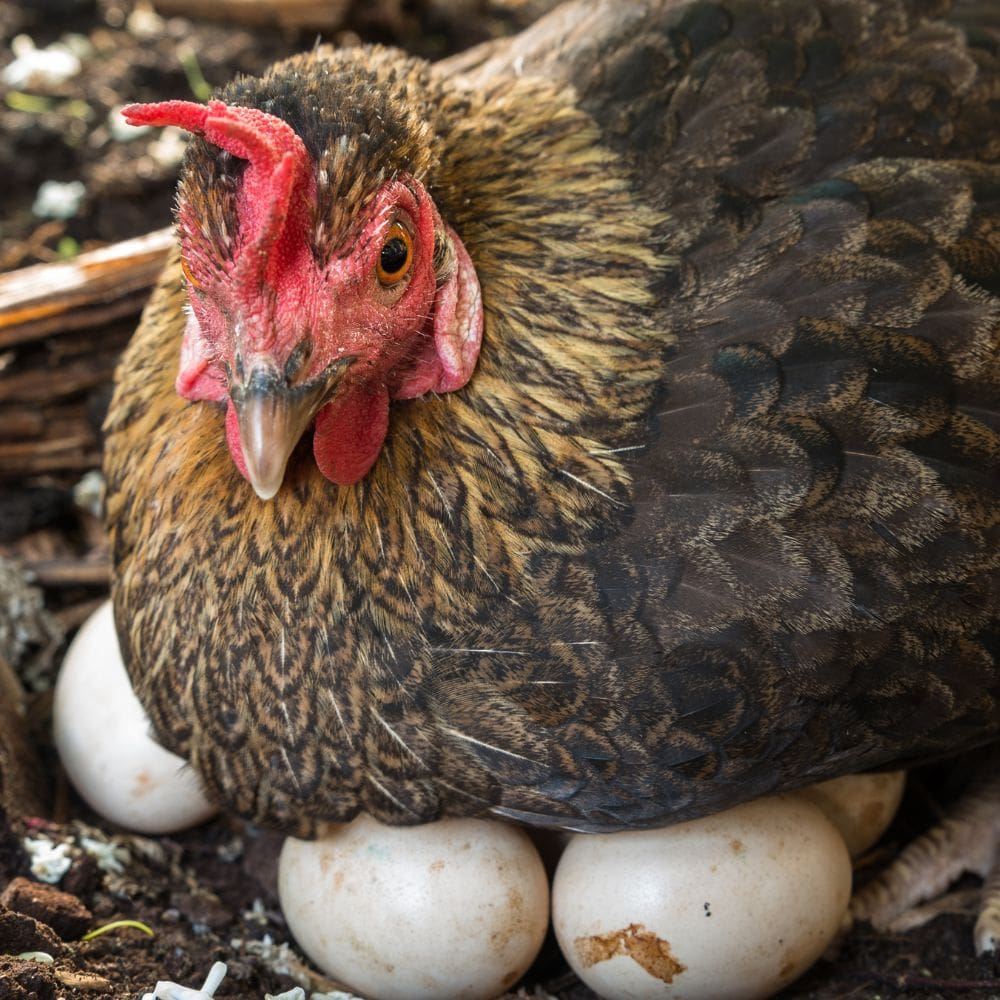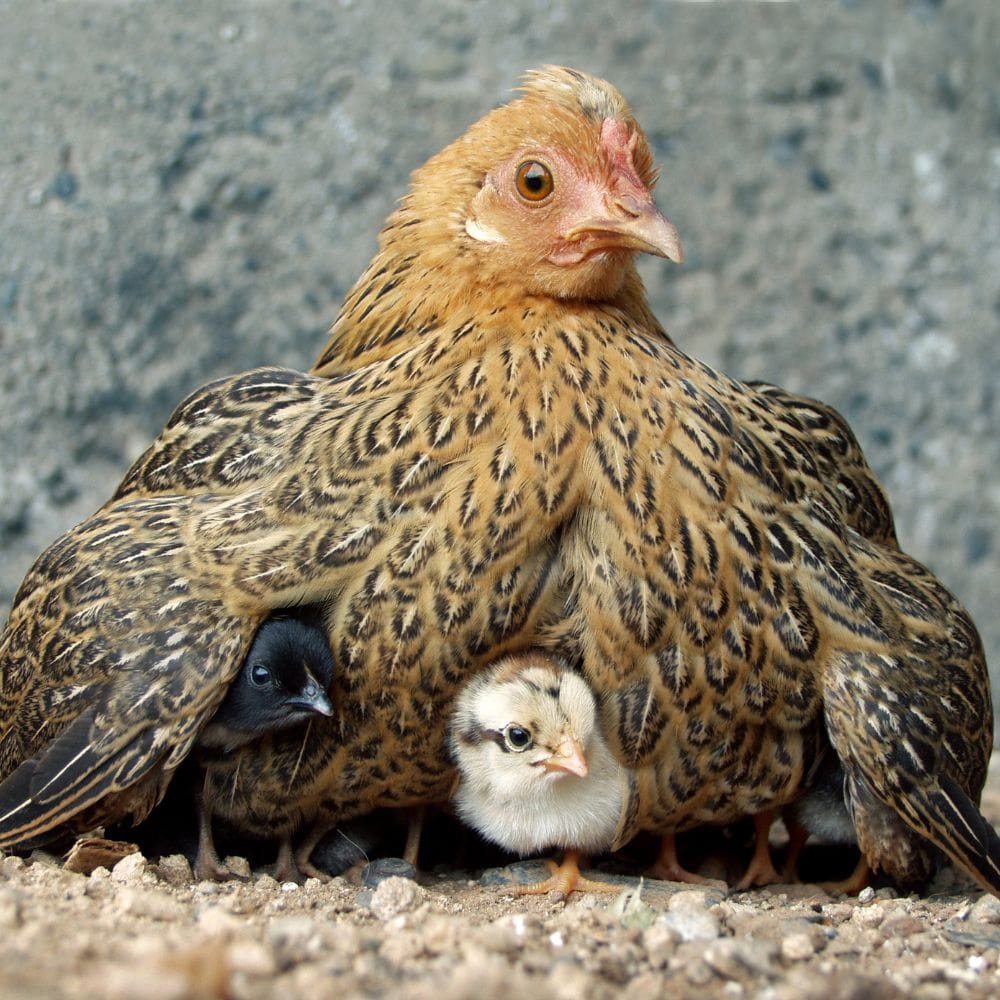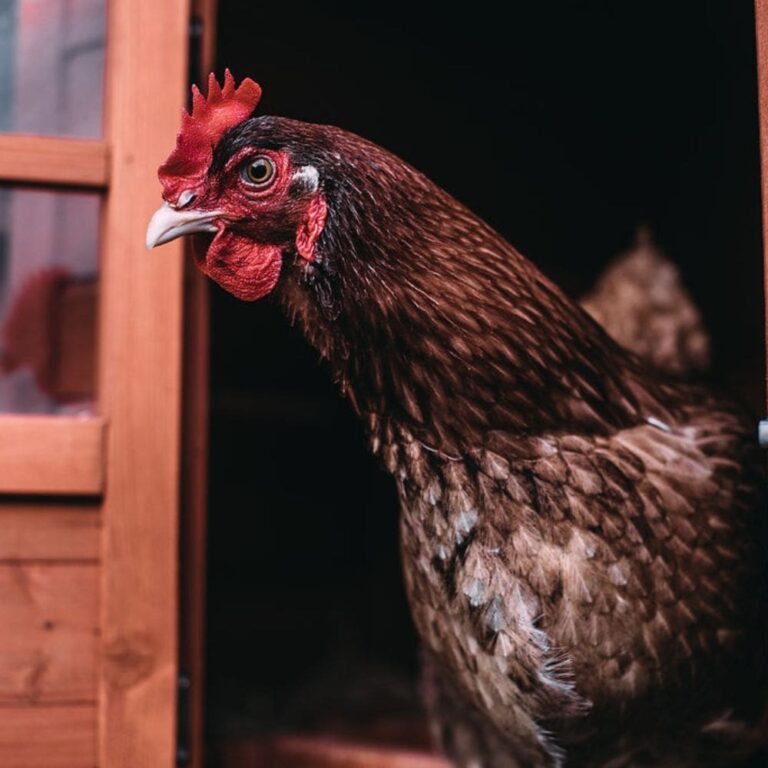Know what a broody hen is? Do you want your hen to hatch chicks? Or do you want a lot of eggs for eating? It’s something to consider and plan for either way.
In this post, you will learn what having a broody hen means, how to encourage and help if you want, and how to hinder (or attempt to stop) it if needed. Plus some fun-loving broody stories you don’t want to miss!

Table of Contents (Quickly Jump To Information)
What Exactly Is A Broody Hen?
When a hen goes “broody” it means she wants to hatch some chicks. It also means she will want to sit on eggs and stay there for the vast majority of her time for 21 days (or more) in a row in order to incubate the eggs.
It sounds precious, but broody hens are usually pretty darn serious about their job of sitting on their eggs. They can get downright mean about it. A broody hen will likely peck you and squawk and do just about anything to stay on those eggs and keep you away.
I can relate. I recall walking around in life happily content as a childless woman until one day…one day something inside me changed and I had a strong desire to have a baby. All my mind could think of was “must have baby now!” 😆Mama hens act the same way when they go broody. Their natural instinct and hormones kick in and you better watch out!
But chickens aren’t people (I know, some of us chicken lovers would happily debate that), and people who own chickens have to make the decision to let their hens hatch chicks or not. So let’s take some things into consideration.
How Do I Know If My Hen Is Broody?
It’s actually quite easy to know, and once you know…you know – if you know what I mean! You’ll go to your chicken coop to gather eggs and you’ll see one of your darling flock members in the nesting box but she won’t want to come out to greet you like normal.
You think to yourself “hmmm I wonder why she isn’t getting out of the box now…oh no, is she sick?” And then you’ll reach in to gather the eggs she’s sitting on and she will surprise you with aggression. She will NOT get off the eggs and you will NOT take her eggs (according to her).
She also might pull out some feathers to “nest.”
And there you have it! You have yourself a merry little broody hen.
Should I Let My Broody Hen Stay On Her Eggs?
This is a choice you will need to make for your hen since you are the chicken boss! Here are some things to think about:
- Do you have a rooster? This is a big one! If you don’t have a rooster you won’t have fertile eggs and there will be no chicks no matter how long she sits on them. Even though you might be tempted to let your hen sit on the eggs, because it makes her happy, it will result in rotten eggs and a disappointed hen.
- When your chicken broods, she will stop laying eggs. So if eggs are what you want, then you’ll need to try and break her desire for hatching eggs. Not to mention, other chickens can be influenced by her broody behavior. This will result in you having a talk with your chickens – “if all your coop mates jumped off a bridge, would you jump off the bridge too?” 😉
- If you want your hen to produce chicks, then you’ll want to allow her to brood. But there are very important things to know before doing this! More on that next.
How To Help a Broody Hen Be Successful
If you decide you want to give it a try and let your happy hen live her dream of motherhood, there are things you need to know.
I’ve had several successful runs at letting hens hatch eggs and raise the chicks. I’ve also had a few attempts that turned out in tragedy. Here’s what I learned…
Nesting Location
My success stories were 100% based on the coop setup. I had a moveable chicken tractor with an upstairs and a downstairs (the downstairs was bottomless and that’s where the chickens hunted and pecked at grass and bugs). Upstairs is where they went to visit their nesting boxes.
My nesting boxes were level with the floor so the chickens didn’t have to jump up to get in the boxes. When a hen went broody, I simply closed off the opening to the ramp so she couldn’t go downstairs anymore. The rest of the hens just had to stay in the lower section while I kept the upstairs closed off for a while.
When she hatched chicks, there was no chance the chicks could fall out of the nesting boxes (or down the ramp because it was now closed off), and the chicks could also follow mama hen around and access food and water. It worked beautifully this way, and not just once but with many broody hens.
Well then, we moved and I sold that chicken tractor. I upgraded to an amazing barn with two separate coops, both with a set of nice laying boxes. But the laying boxes are up off the floor so the chickens have to jump up to get into them.
The result is that when they hatch chicks in the boxes that are up off the ground, the chicks fall out and die from being too cold or get pecked to death by other chickens. Even if that wasn’t the case (which it would be), when they are in the nesting boxes up off the ground the chicks cannot follow the mama to get food and water. This also results in death.
Relocating Hen With Eggs
I had a crazy broody hen sitting on eggs in nesting boxes that were up off the ground. I knew that wasn’t good because, as stated above, when the chicks hatch they fall out of the boxes and die one way or another. They also cannot get to food and water.
So, I took the eggs from my broody girl every day…for many, many, days to try and redirect her (so she would lose the broody urge). A couple of weeks went by and she was just plain determined to hatch those eggs. There was nothing I could do to stop her from trying. So I had mercy on this wanna-be mother hen and decided to move her and her eggs to a safe, ground-level nesting area.
I worked very hard to make her space inviting and comfortable…I even hung up a curtain so it would be dark and private like they prefer. And then I moved her eggs quickly, followed by moving her into her new safe space. And guess what she did? Do you think she laid on those eggs and sent me a thank you card? Heck no!
She screamed (I had never heard a chicken scream before, but she definitely screamed) over and over and over again and ran from one side of the pen to the other…back and forth, back and forth. And she didn’t sit on the eggs for even one second. She panicked at the change and she completely freaked out. So, I moved her and her eggs back to the box that was doomed for death.
She hatched those eggs and I knew what was going to happen next. So I built an extension to her nesting box so I could at least put food and water in it so the chicks could access it. But the space was too small and she trampled a couple of the chicks. I ended up removing the chicks and putting them in my brooder inside the house under a heat lamp.
Hmmpfh. If only chickens could reason. The moral of this story is YOU CAN’T RELOCATE A BROODY HEN WITH HER EGGS!
Other Tips To Help Your Broody Hen
Mark the Eggs
Your broody hen will likely completely stop laying eggs. But her coop buddies won’t (unless she influences them to also be broody). The hens that are still laying will take any opportunity they have (when your broody girl gets out of the box for just a minute to get a drink and a snack) to lay more eggs in the nest.
This doesn’t sound like a problem, but it is. The reason it’s a problem is that the eggs will then be at different stages of development. When the first group of eggs hatches the mama will not sit on the remaining eggs and the little chick embryos will die. The solution to this is to take a pencil and make an X on the eggs in the beginning. Then check each day and remove any eggs that don’t have an X.
Easy enough? Well, not so fast. Remember your broody hen will likely be aggressively protecting her eggs. You might have to wear gloves (or an armored suit 😉) to get the eggs out. Also, you will need to leave all the eggs alone for the last three days of the 21-day cycle because the eggs shouldn’t be turned during those days.
Prepare the Space
Be sure your mama hen has access to food and water during sitting and hatching. Preferably pretty close to where she is sitting on eggs so she will be sure to stay hydrated and nourished while she sits. She’ll love you all the more, and be healthier for it if you give her protein-rich treats in the box too. Click here to see my favorites!
After she hatches eggs, you need to be sure the chicks can also easily access food and water in order for them to survive. The mama doesn’t feed them like wild birds feed their young. I remember having a successful hatch and being so proud. And then that night, while trying to sleep, I sat straight up in bed and thought…how are the chicks eating?
I quickly remembered that the mama doesn’t take care of this and I ran out to the barn to provide food and water where the baby chicks could access them. It’s a bit embarrassing to share this story, but if helps just one person and their chicks – it’s worth the red cheeks. 😳
Number of Eggs Your Hen Can Sit On
While there isn’t a magic number, there is a good guideline. Your hen can sit on approximately 12 eggs at a time with success. This is using the standard of her own personal egg size – meaning a bantam can sit on 12 bantam-sized eggs, etc.
To my surprise I found one of my broody hens stealing eggs from another box and moving them to her box to sit on! No kidding! It was a sight to see. I had no idea a chicken could do such a thing, but I saw it with my own eyes. I thought about contacting America’s Got Talent but decided I didn’t want to deal with the paparazzi. 😁
So be sure to check the eggs daily and remove any you haven’t marked (see this explained above).
How Many Days Will Your Hen Sit On the Eggs?
It typically takes 21 days for a hen to hatch chicks. Interesting side note, if you incubate eggs, it will be precisely 21 days. When a mama hen incubates eggs it can vary. This is because she is incubating in less certain conditions. The eggs have to be at a specific temperature and humidity to grow.
When a hen is sitting in various, fluctuating temperatures and humidity percentages – things are a little less predictable. It can take up to 30 days in some cases. In my experience, it usually takes about 25 days when I let the hen incubate. Just remember not to touch the eggs at day 18 and on (it can prevent the chicks from being able to peck out of the eggs).
The first time I allowed a hen to be broody, I thought we failed but I held out just in case I counted my days wrong. Truthfully, I knew I didn’t but I was sad about the eggs not hatching. And on day 25 I got a big surprise and boy was I thrilled!
Lice, Mites, and Other Parasites
If you do let your hen go broody she will basically be sitting in one place for 21 to 30 days. This will make her more susceptible to getting an overload of lice, mites, and other parasites.
The good news is that you can help prevent this by putting some herbal nesting magic or dust bath herbs right in her nesting box!

Should You Just Incubate the Eggs Yourself?
If you have an incubator you can just incubate the eggs yourself. While that is a fine option, and I’ve done it many times, it doesn’t solve the issue of your hen being broody. She’ll just keep sitting on eggs every day in hopes to be a mother…unless you take other steps to hinder her from being broody. Click here to learn about that).
Beyond that, there are still some things to think about. For one thing, it’s a lot less work for you. If you set it up right, the chicken can incubate, hatch, and raise chicks. It’s also less expensive and less time intensive because you don’t have to run and monitor an incubator for 21 days. And you don’t have to clean up the incubator, which is a BIG job).
In addition to that, if you let the mama raise the chicks – you don’t have to keep an electric hogging heat lamp plugged in for weeks. You also don’t have to clean up the brooding box every day. You will have to keep the coop clean if the mama is raising the chicks. But let’s face it – it doesn’t call for the same kind of cleaning as a brooder box does.
All that to say, if you are lazy (or efficient), letting the mama hen do all the work is a great option. That being said, incubating eggs and brooding the chicks yourself is more predictable and easy to plan. It’s just a lot more work.
How to Hinder a Broody Hen
You might be yelling “But wait, I don’t want chicks! I just want my eggs!” If that’s the case here are some steps you can take to possibly redirect your hen. Warning: It’s a natural instinct that is hard to hinder.
- Remove your broody hen from the nesting box and take all the eggs while you are at it. Do this several times a day. She may get tired of it and decide it’s not worth it. Some breeds are broodier than others, so this may or may not work.
- Put a frozen water bottle under her. It may sound mean because it is. 😣However, it might just do the trick.
- Change her location if possible. Move her to another coop or shed or cage for a few days. The disruption might get her mind on something else. Also, if the new location doesn’t have an inviting nesting box she may not find it suitable to brood.
- Take all nesting material out of the nest box to make it an uninviting atmosphere. The problem with this method is that it may also deter your hens from laying eggs in the boxes.
What Chicken Breeds Are Especially Broody?
Of course, there are many more breeds but this list will get you started.
What Chicken Breeds Are NOT Especially Broody?
If you already know you simply don’t want broody hens, you should consider buying hens that don’t usually go broody. Here are a few to consider. Keep in mind it’s pretty safe to target hybrid chickens because they were developed to be high egg producers that don’t go broody.
Summary
Should you let your hen sit on eggs or not? You have to decide what is best for you and your chickens. The most important thing is to be knowledgeable and prepared either way. And if you read this article then you are already doing your part to learn and prepare.
In the whole scheme of things, it doesn’t really matter what you decide. So take a deep breath and choose whichever path you want to choose. And don’t forget to give your chickens lots of love! 💕

A happy wife, mother, teacher, writer, hobby farmer, lover of chickens, and contributor to Pampered Chicken Mama!



![Chickens Not Laying? Here’s Why. Session 2 Of “What The Cluck?” [Podcast]](https://thefrugalchicken.com/wp-content/uploads/2015/10/podcast-session-2.jpg)


![You CAN Raise Meat Chickens (And Actually Go Through With It!) [Podcast]](https://thefrugalchicken.com/wp-content/uploads/2016/01/raise-meat-chickens-feature-min.jpg)